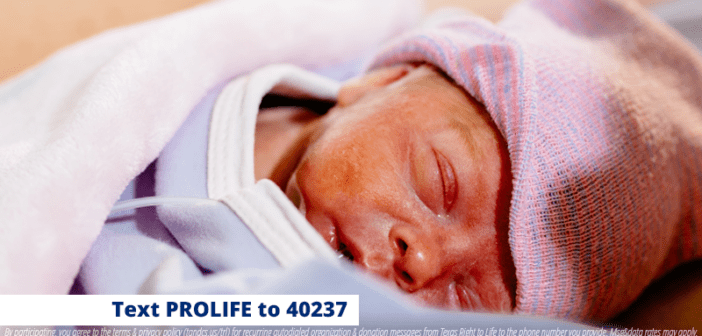This week, the Supreme Court of Texas (SCOTX) heard arguments in a case attempting to broaden exceptions to Texas’ strong Pro-Life laws in the Zurawski v. State of Texas lawsuit.
Zurawski v. State of Texas alleges that the medical exemption in Texas’ Pro-Life laws, specifically in the Texas Heartbeat Act and Trigger Law, are unclear and insufficient. The suit is brought by the anti-Life Center for Reproductive Rights (CRR) on behalf of 20 women and two doctors who believe they should have qualified for a medically-necessary abortion. The women fall within three general categories: those whose lives were threatened by their pregnancies; those whose lives were not at risk but who would prefer to have an abortion due to a low-risk medical issue; and those whose children were diagnosed with a life-limiting disability.
As current Texas law stands, medical intervention is allowed where the mother’s life or bodily function is in jeopardy if her pregnancy continues. Pro-Life policies do not require the threat to be “imminent,” only that the severe medical risk be foreseeable. According to state law, a “medical emergency” is:
“a life-threatening physical condition aggravated by, caused by, or arising from a pregnancy that, as certified by a physician, places the woman in danger of death or a serious risk of substantial impairment of a major bodily function unless an abortion is performed.”
In August, an anti-Life judge in Travis County sided with abortion activists in their lawsuit against the State of Texas. The pro-abortion group bringing the lawsuit claims that doctors should use their own medical judgment to decide when an abortion is medically necessary rather than rely on an objective medical standard. Their proposed language for “medical exceptions” would create such a wide loophole that it would likely allow elective abortions.
The injunction from August temporarily prevented several state entities from enforcing the law against doctors who abort babies with disabilities or in a wide range of “health” related cases. Thankfully, the Texas Attorney General’s office appealed the lower court’s decision to SCOTX and halted it, keeping Texas’ Pro-Life laws fully enforceable as the case progresses.
In the most recent hearing, CRR argued that the standard should be subjective, rather than objective. This would open the door to shield doctors from liability if they can claim they used their best personal judgment. CRR repeatedly conflated life-of-the-mother cases with those where the child was diagnosed with a life-limiting disability. This lawsuit endangers preborn babies with life-limiting illnesses, who are just as worthy of the Right to Life as any other human being.
The Center for Reproductive Rights is exploiting these tragic life-threatening cases as a gateway to allow for prematurely ending the lives of preborn babies with critical health conditions. The plaintiffs in this lawsuit undeniably have faced heartbreaking circumstances. However, this comes down to a misunderstanding, not a shortcoming, of the law. The plaintiffs whose lives were in danger and who were denied care until they were in critical condition are victims of medical malpractice and negligence, not of Texas law.
Several SCOTX justices questioned the CRR attorney, asking why the plaintiffs were suing the State rather than the physicians who denied them the care to which they were entitled. This again highlights how the fault is not with the current law, but with the implementation.
Beth Klusmann, the attorney speaking on behalf of the State, ended her arguments by clarifying that “the legislature … has chosen to value unborn life and prohibit abortion in all circumstances unless that life is going to conflict with the life of the mother.”
There are a few possible rulings that can come out of this hearing. SCOTX can leave the injunction in place, weakening the law. They can allow the law to be enforced as written while the merits of the case are decided. They can ask the plaintiffs to go back and rework the case in the district court. Or, they can toss the lawsuit out altogether, allowing our Pro-Life laws to carry on as written.

Don’t miss important Pro-Life stories like this.
>> Get the Pro-Life Weekly Highlight just once a week:
Texas Right to Life Legislative Director Rebecca Weaver explained:
“Inaccurate, pervasive, and politically-motivated media reporting, along with silence from medical associations, have misled doctors into believing that a pregnant woman must be at death’s door in order to intervene. This is not true of Texas law. The solution to this confusion is not to legislate from the bench but for the current law to be implemented appropriately by medical associations and not needlessly put pregnant women and their preborn children at risk.”
Ultimately, our Pro-Life laws are written to save lives — born and preborn. A recent report indicates that there have been around 32,000 more babies born annually in states like Texas that have restricted abortion. Texas had one of the highest increases, with births rising by 5.1%. Thousands of children are alive today because of our strong Pro-Life policies.
We now wait on SCOTX to make a decision. In the meantime, Texas Right to Life continues to call for state agencies and medical associations to provide guidance and clarification to our health professionals so our state can keep protecting all preborn children while not needlessly putting their mothers’ lives at risk.
Thank you for reading this story! If you support our Pro-Life ministry, chip in with a life-saving contribution today!



